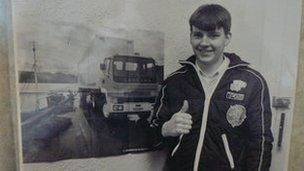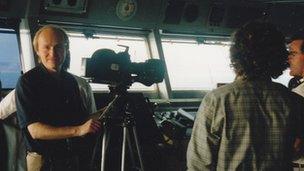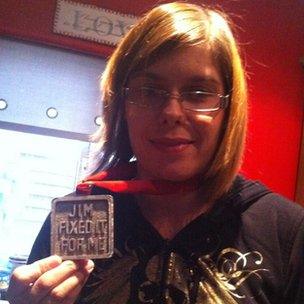Jimmy Savile: Your memories
- Published
Former DJ, TV presenter and charity fundraiser Sir Jimmy Savile has died, aged 84. Savile was one of the most famous names on British TV and radio in the 1960s, 70s and 80s.
Here, BBC News readers share their memories.
Paul Bruce, Glasgow

Jim fixed it for Paul Bruce
I wrote to him when I was 13 years old asking to be allowed to drive an HGV.
I lived in Blackpool at the time with my parents. My father was an HGV driver and I wanted to grow up and be just like my Dad.
I got a letter back from one of the producers of the programme telling me I was going to be on the show. I went to a training place in Preston, they had me driving a brand new HGV.
I was doing manoeuvres, three point turns and I even drove it up to 30mph.
Then I was invited down to London for the filming. I remember Jimmy then as a frail old man, but a real nice guy.
I met Pan's People and Lenny Henry in Television Centre. It was fantastic experience. He was a fantastic man.
It has helped me get jobs in the past too. When people find out that Jim fixed it for you, it opens doors!
Graham Smith, Harrogate

Graham Smith on the bridge of the QE2
I lived in the apartment directly below Sir Jimmy for a few years and worked as a documentary cameraman on Jim'll Fix it.
We did one Fix It on the QE2 when a boy had written in asking to be a waiter on the cruise ship. That was great fun. There was a lady in her 70s who wanted to be part of the White Helmets motorcycle display team. I ended up filming on the pillion seats of one of the bikes - an amazing experience.
I also worked with Sir Jim on a video for Leeds General Infirmary.
I got to know him quite well as a neighbour as well as professionally. I was always impressed with the way he was around the hospital. He would chat with everyone and spend time with everyone. He was never too busy, he really liked people and he was happy to spend time with them.
He would factor extra time into his journeys around the hospital because everyone wanted to talk to him.
Margaret Thatcher asked him to look after the wives of the G7 leaders during a conference. He took them to Stoke Mandeville. They were confronted by a man in tracksuit and jewellery but by the end of the day, they were eating out of his hand.
Marie Jackson, Wolverhampton
As a kid, I wrote in everywhere: Blue Peter, Jim'll Fix it and all the local radio stations.

Marie Jackson and her prized badge
I was also quite unusual as I played the bagpipes as a child.
I had quite bad asthma and my doctor recommended that I should play a wind instrument. My Dad said there was no better wind instrument than the bagpipes.
My Dad and I used to watch the Edinburgh Tattoo together. I always wanted to be the lone piper at the end.
I wrote to Jim to ask him to fix it for me.
I didn't tell my parents that I had written. One day we got a phone call.
The producers came down and listened to me play the pipes. Shortly afterwards my Dad and I went to Edinburgh. As a surprise they had arranged for Massed Pipes and Drums of the local regiments to play with me.
While we were in Scotland we bought Jimmy a small cigar as a present. When we got to the studio in London, he was smoking one of his trademark cigars.
I was thrilled when he binned his great big cigar for the little one I had bought.
I do tell people that Jim fixed it for me. They always think I am making it up but it is a great starting point for a conversation.
Keith Walters, Norwich
I had the privilege of meeting Jimmy when I was a young doctor working in the Spinal Injury Unit at Stoke Mandeville Hospital. It was during the time he was raising money for the unit.
Out of sight of the cameras it was clear to me how intelligent and thoughtful he was. He told me that when it came to choosing architects for the new unit he did not want someone who had designed hospitals before because they may have pre-conceived ideas.
He deliberately chose someone who had never designed a hospital. In his words he got, "A grand hotel with a hospital inside it."
I went back and visit the unit after it was built, there is no doubt it was a better place. The new purpose-built building was much better for patients.
He knew how to boost the morale of the spinal patients. He would come in with the TV cameras and film one of them. He maintained that doing that would cheer everyone up especially as the other patients would think it may be their turn next time.
I also met him at Leeds General Infirmary. He made a huge difference to patients' lives. He knew how to help patients and how to talk them.
- Published30 October 2011
- Published30 October 2011
- Published29 October 2011